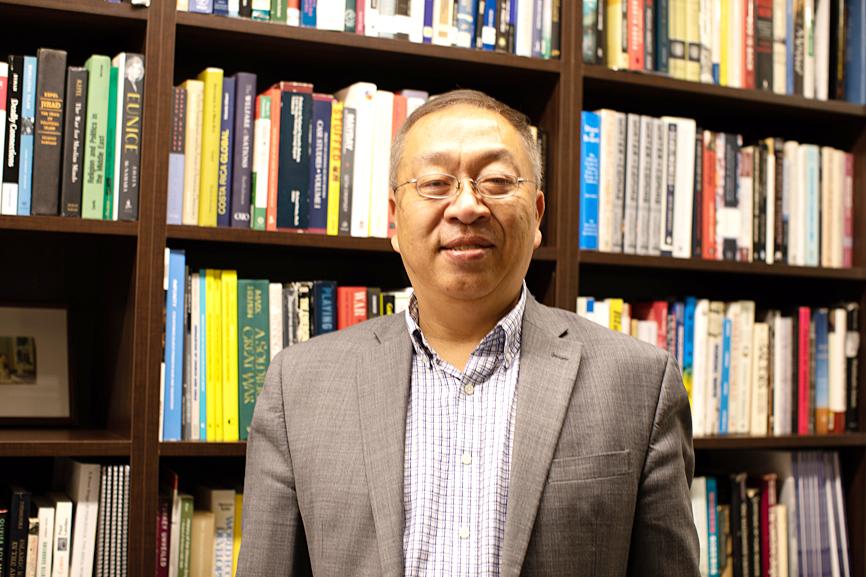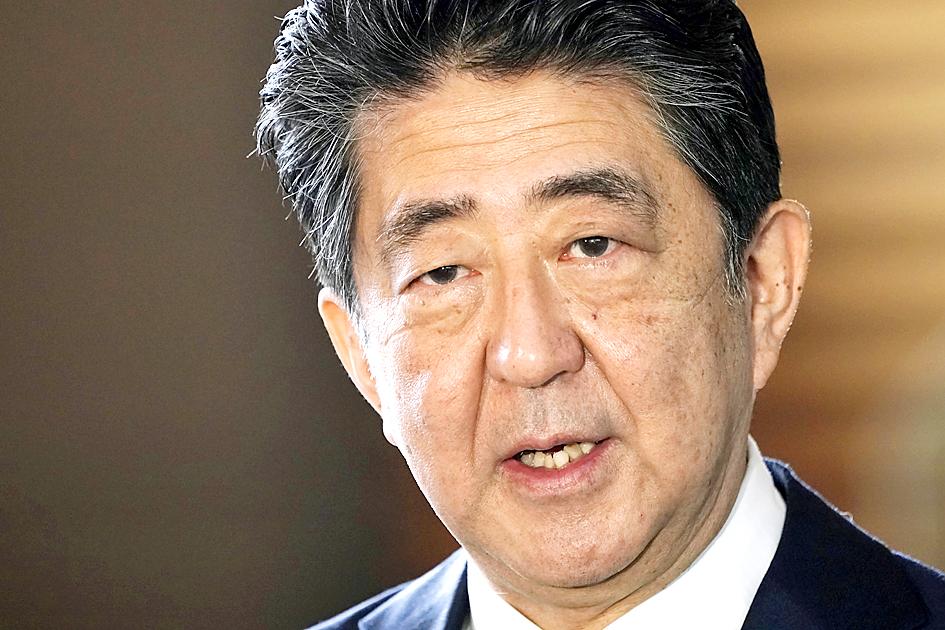The top China adviser to former US secretary of state Mike Pompeo on Saturday said that Taiwan is safer than Ukraine amid growing concern that Russia’s invasion of its neighbor might affect the situation across the Taiwan Strait.
Miles Yu (余茂春), who is now a senior fellow at the Hudson Institute, made the comments in a broadcast interview days before he and Pompeo are scheduled to arrive in Taiwan.
During their visit from Wednesday to Saturday, the two former officials are to meet with President Tsai Ing-wen (蔡英文), as well as other top government and business leaders.

Photo: CNA
Speaking in Chinese with political commentators Wang Hao (汪浩) and Akio Yaita on the Chinese Television System, Yu said that unlike Ukraine, which underestimated Russia, Taiwan is sufficiently wary of Beijing.
Tsai’s government is also strategically aligned with the US and other democracies, making Taiwan “safer than Ukraine,” he said.
Yu said that the US made a “revolutionary leap” in its policy toward the Asia-Pacific region and especially toward Taiwan during the administration of former US president Donald Trump.

Photo: AP
Taiwan is no longer considered just a facet of US-China relations or a small global competitor, he said, adding that the nation now “plays a more prominent role” in global foreign policy.
While it is true that Pompeo was “the most pro-Taiwan” US secretary of state, his sentiment came amid the larger context of US appreciation for Taiwan’s liberal democracy and overall elevation of bilateral relations, he said.
The US believes China harbors a “chain of aggression” toward not only Taiwan, but also Japan, India, Vietnam and other countries around the South China Sea, he said.
“If China is allowed to take a first step, it will inevitably take a second and a third,” he added.
As for Taiwan’s defense, Yu said that its neighbors are all deeply aware of China’s intentions in the wider region and some — including Australia and Japan — have made it clear that they must stand with Taiwan if it faces a military threat.
The US has been even clearer, he added.
From the Indo-Pacific strategy framework and other indications presented by US President Joe Biden’s administration, it is apparent that the new policy direction actualized under Trump has not and cannot be changed, Yu said.
Even in a deeply polarized US Congress, the one issue that enjoys widespread consensus is Taiwan, he said, adding that this kind of architecture would be “hard to change.”
Yu also said that defending Taiwan is the “shared responsibility of democracies,” as allowing Taiwan to fall would pose a threat to democratic nations in Asia and around the world.
Chinese military action against Taiwan would also result in harsher and more effective sanctions, as its economy is more globally integrated than that of Russia, he added.
Yu also commented on the Shanghai Communique, which was signed 50 years ago by then-US president Richard Nixon and Mao Zedong (毛澤東).
Against the background of the Cold War, the two leaders sought to establish a framework for cooperation based on shared interests rather than shared values, he said.
Setting aside incompatible values was a compromise and a gamble, Yu said, adding that this all changed under the last US administration.
The greatest difference is a thorough disappointment with the integrity of the Chinese Communist Party, he said.
As Pompeo has said, the US’ approach to dealings with China should be to “distrust and verify,” Yu said, referring to a reinterpretation of former US president Ronald Reagan’s mantra “trust, but verify” about the Soviet Union in the 1980s.
This is similar to the feeling among Taiwanese, who harbor greater distrust of Beijing than anyone else, he added.
At its essence, the US-China-Taiwan relationship is a struggle between liberal democracy and authoritarianism, “further demonstrating the importance of Taiwan,” Yu said, advocating for the “wholesale abandonment” of the US’ policy of shared interests over shared values.
Separately yesterday, former Japanese prime minister Shinzo Abe in response to fears of a looming Chinese invasion of Taiwan said that a “Taiwan contingency is a Japan contingency.”
In an interview on Japanese television, Abe also called on the US to abandon its strategy of “strategic ambiguity” and declare that it would help defend Taiwan in the event of an attack.
Additional reporting by CNA

A magnitude 5.6 earthquake struck off the coast of Yilan County at 12:37pm today, with clear shaking felt across much of northern Taiwan. There were no immediate reports of damage. The epicenter of the quake was 16.9km east-southeast of Yilan County Hall offshore at a depth of 66.8km, Central Weather Administration (CWA) data showed. The maximum intensity registered at a 4 in Yilan County’s Nanao Township (南澳) on Taiwan’s seven-tier scale. Other parts of Yilan, as well as certain areas of Hualien County, Taipei, New Taipei City, Taoyuan, Hsinchu County, Taichung and Miaoli County, recorded intensities of 3. Residents of Yilan County and Taipei received

Taiwan has secured another breakthrough in fruit exports, with jujubes, dragon fruit and lychees approved for shipment to the EU, the Ministry of Agriculture said yesterday. The Animal and Plant Health Inspection Agency on Thursday received formal notification of the approval from the EU, the ministry said, adding that the decision was expected to expand Taiwanese fruit producers’ access to high-end European markets. Taiwan exported 126 tonnes of lychees last year, valued at US$1.48 million, with Japan accounting for 102 tonnes. Other export destinations included New Zealand, Hong Kong, the US and Australia, ministry data showed. Jujube exports totaled 103 tonnes, valued at

TRUST: The KMT said it respected the US’ timing and considerations, and hoped it would continue to honor its commitments to helping Taiwan bolster its defenses and deterrence US President Donald Trump is delaying a multibillion-dollar arms sale to Taiwan to ensure his visit to Beijing is successful, a New York Times report said. The weapons sales package has stalled in the US Department of State, the report said, citing US officials it did not identify. The White House has told agencies not to push forward ahead of Trump’s meeting with Chinese President Xi Jinping (習近平), it said. The two last month held a phone call to discuss trade and geopolitical flashpoints ahead of the summit. Xi raised the Taiwan issue and urged the US to handle arms sales to

BIG SPENDERS: Foreign investors bought the most Taiwan equities since 2005, signaling confidence that an AI boom would continue to benefit chipmakers Taiwan Semiconductor Manufacturing Co’s (TSMC, 台積電) market capitalization swelled to US$2 trillion for the first time following a 4.25 percent rally in its American depositary receipts (ADR) overnight, putting the world’s biggest contract chipmaker sixth on the list of the world’s biggest companies by market capitalization, just behind Amazon.com Inc. The site CompaniesMarketcap.com ranked TSMC ahead of Saudi Aramco and Meta Platforms Inc. The Taiwanese company’s ADRs on Tuesday surged to US$385.75 on the New York Stock Exchange, as strong demand for artificial intelligence (AI) applications led to chip supply constraints and boost revenue growth to record-breaking levels. Each TSMC ADR represents